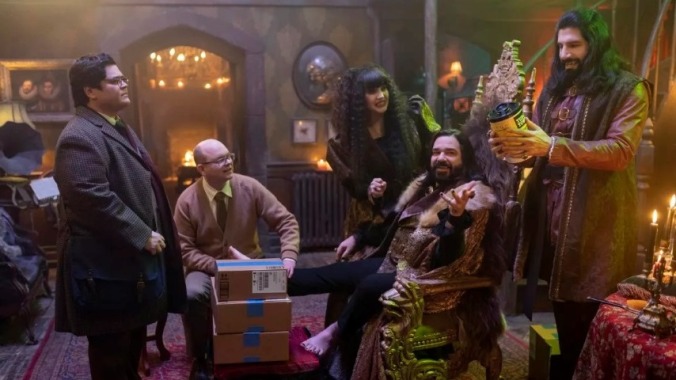It Feels Too Early to End What We Do in the Shadows
Photo by Russ Martin / FX
What We Do in the Shadows wraps up its sixth and final season on FX tonight, and it feels way too soon. This season hasn’t been noticeably worse than any of the others, and a recent poll of 20 TV critics determined it was the second best show of 2024. (Okay, yes, it was our poll—obviously it’s our poll.) Quality’s always up for debate but people still clearly love the show, so why wrap it up now?
No TV show lasts forever, but a couple that are on the air right now seem destined to try: The Simpsons, which might be able to pull it off if people cotton to the inevitable change in voice actors, and It’s Always Sunny in Philadelphia, which hasn’t really slipped despite airing 16 seasons across 20 years. We’re not going to mention The Simpsons again—it’s still on but hasn’t been that great since last century—but Always Sunny is a great comparison for What We Do in the Shadows. First off, they’re on the same network (basically—I think Always Sunny still calls the totally unnecessary spinoff channel FXX home, but most people probably watch both shows via Hulu at this point and not basic cable), so FX is clearly okay with auto-renewing its defining comedies. Secondly, both shows are about monsters—Shadows literally, whereas Sunny’s far more beastly characters are only figuratively monsters. Four male leads, one female, almost all of them total self-involved assholes… they’re basically the same show, only one is about vampires in Staten Island, and the other is about something even scarier: Philadelphians in Philadelphia.
(Curb Your Enthusiasm, a third comedy that seemed destined to run indefinitely, claims to have run its final season this year, but I don’t think anybody will believe it’s truly over as long as Larry David is alive and mentally and physically capable of making more.)
One thing potentially holding Shadows back, and maybe making its creative team feel like it’s time to bring the show to a close, is that its vampires don’t show a lot of growth from season to season. That’s perhaps the most impressive thing about Always Sunny; it’s been able to develop The Gang over the last 20 years without losing sight of their core character traits and the dynamic that makes the show work. That’s easier to do with humans aging from their late 20s into their late 40s than with literally ageless vampires who have been around for centuries. Shadows essentially resets after each season, with only Harvey Guillén’s human familiar Guillermo growing and changing year-to-year. (Part of what makes Shadows so marvelous is that, despite its unrealistic milieu, it and Guillén have made Guillermo a nuanced, grounded character more than capable of shouldering the vast majority of its emotional burden.) It probably feels limiting to a writer to have characters who are inherently incapable of change, even in a show that puts comedy over emotion.
-

-

-

-

-

-

-

-

-

-

-

-

-

-

-

-

-

-

-

-

-

-

-

-

-

-

-

-

-

-

-

-

-

-

-

-

-

-

-

-








































